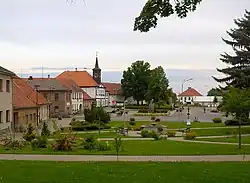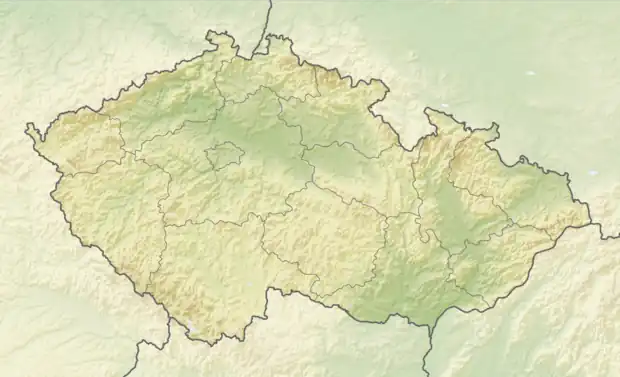Vilémov | |
|---|---|
 Town square | |
 Flag _CoA_CZ.gif) Coat of arms | |
 Vilémov Location in the Czech Republic | |
| Coordinates: 49°48′57″N 15°32′9″E / 49.81583°N 15.53583°E | |
| Country | |
| Region | Vysočina |
| District | Havlíčkův Brod |
| Founded | 1119 |
| Area | |
| • Total | 24.57 km2 (9.49 sq mi) |
| Elevation | 358 m (1,175 ft) |
| Population (2023-01-01)[1] | |
| • Total | 988 |
| • Density | 40/km2 (100/sq mi) |
| Time zone | UTC+1 (CET) |
| • Summer (DST) | UTC+2 (CEST) |
| Postal codes | 582 82, 582 83 |
| Website | www |
Vilémov is a market town in Havlíčkův Brod District in the Vysočina Region of the Czech Republic. It has about 1,000 inhabitants.
Administrative parts
Villages of Dálčice, Hostovlice, Jakubovice, Klášter, Košťany, Spytice, Ždánice and Zhoř are administrative parts of Vilémov.[2]
Etymology
The name is derived from Abbot Vilém, who was one of the founders of Vilémov.[3][4]
Geography
Vilémov is located about 23 kilometres (14 mi) north of Havlíčkův Brod and 45 km (28 mi) north of Jihlava. It lies in the Upper Sázava Hills. The highest point is a hill at 464 m (1,522 ft) above sea level. The market town is situated on the Hostačovka stream. The Doubravka brook, a tributary of the Hostačovka, forms the eastern municipal border.
History
Vilémov was founded by the Benedictines in 1119 and consisted of a monastery complex and a fortified settlement. The monastery was burned down by the troops of King Rudolf I of Germany in 1278, and conquered by the Hussites in 1421.[3] The monks then fled to Uherčice and the convent was never restored here.[5]
In 1469, armies of Matthias Corvinus and George of Poděbrady clashed near Vilémov in the Battle of Vilémov during the Bohemian–Hungarian War.[3]
In 1578, a fortress was built on the foundations of the monastery buildings. A hundred years later, it was rebuilt into a Renaissance castle. In 1684, Vilémov was bought by Count Caretto de Millessimo. He and his family had rebuilt the castle in the Baroque style. They owned the castle until 1852. From 1852 until the confiscation during the World War II, it was owned by the Rajský of Dubnice family.[4]
In 1747, Maria Theresa promoted Vilémov to a market town. In 2006, Vilémov has restored the market town status.[6]
Demographics
|
|
| ||||||||||||||||||||||||||||||||||||||||||||||||||||||
| Source: Censuses[7][8] | ||||||||||||||||||||||||||||||||||||||||||||||||||||||||
Sights

Klášter Castle was returned to the Rajský of Dubnice family in 1991 and is in private ownership since then. The dilapidated building has been renovated by the family and now serves as a hotel and restaurant.[4]
The Baroque Church of Saint Wenceslaus dates from 1726. Its predecessor was a Gothic church consecrated to the Virgin Mary, which served as a parish church of the monastery.[9]
Notable people
- Stanislav Vydra (1741–1804), priest, writer and mathematician; worked here
- Karel Styblo (1921–1998), Czech-Dutch physician
References
- ↑ "Population of Municipalities – 1 January 2023". Czech Statistical Office. 2023-05-23.
- ↑ "Historie obce" (in Czech). Obec Lobodice. Retrieved 2022-02-02.
- 1 2 3 "Historie městyse" (in Czech). Obec Vilémov. Retrieved 2022-03-20.
- 1 2 3 "Historie" (in Czech). Vilémov Castle. Retrieved 2022-03-20.
- ↑ Šrámek, Josef (January 2014). "Benediktinské opatství ve Vilémově na Havlíčkobrodsku a jeho vztahy k Moravě ve středověku" (PDF) (in Czech). ResearchGate. Retrieved 2022-03-20.
- ↑ "Jak je důležité být městysem?". Zpravodaj (in Czech). Obec Vilémov. 2007-03-23. Retrieved 2022-03-20.
- ↑ "Historický lexikon obcí České republiky 1869–2011 – Okres Havlíčkův Brod" (in Czech). Czech Statistical Office. 2015-12-21. pp. 23–24.
- ↑ "Population Census 2021: Population by sex". Public Database. Czech Statistical Office. 2021-03-27.
- ↑ "Historie" (in Czech). National Heritage Institute. Retrieved 2022-03-20.